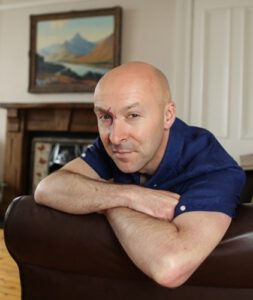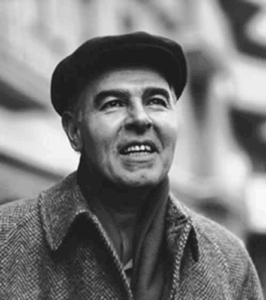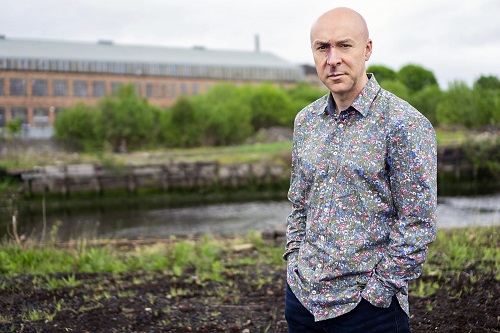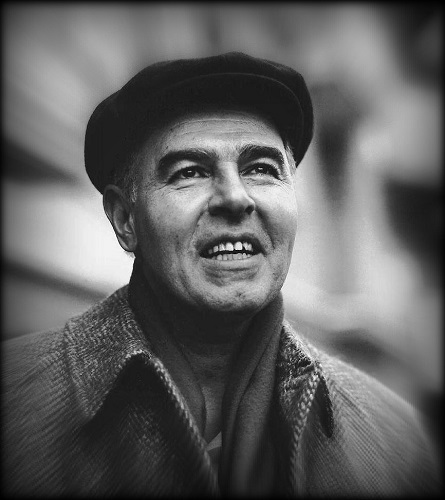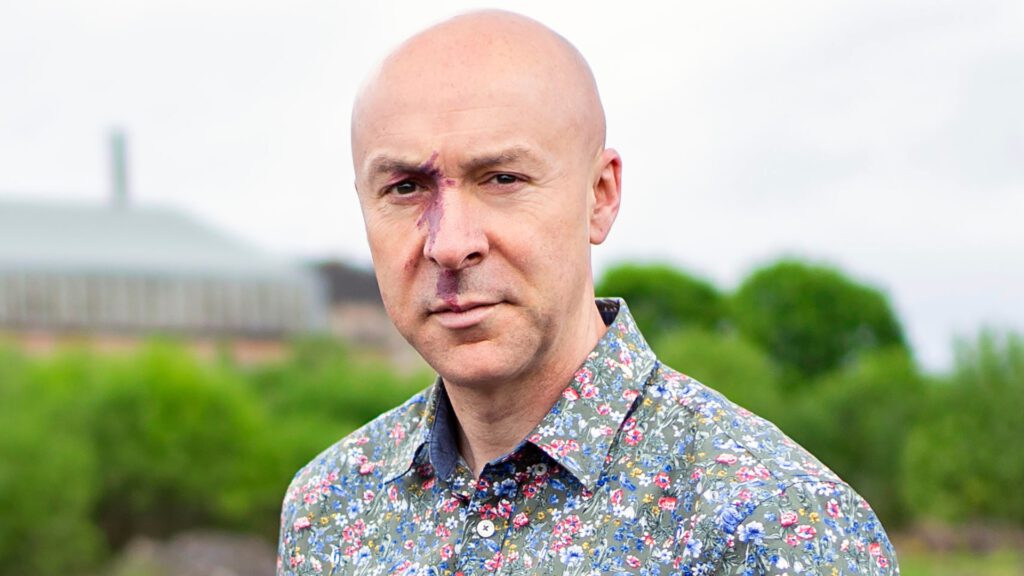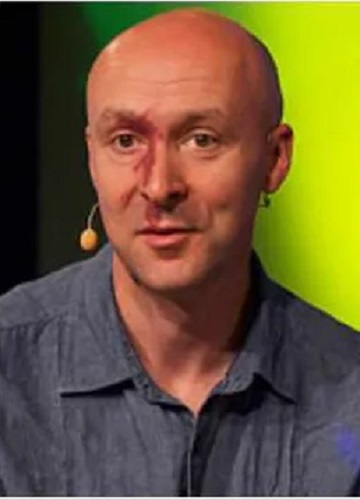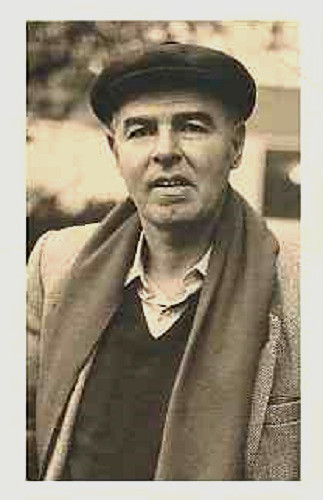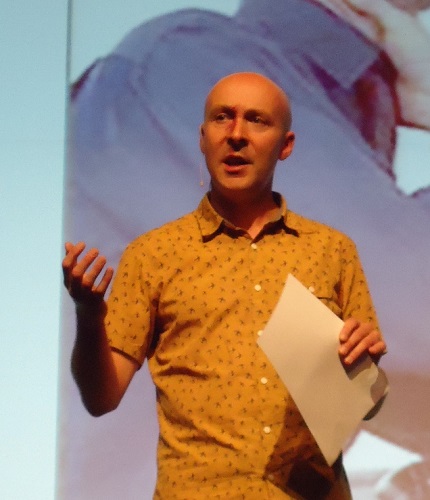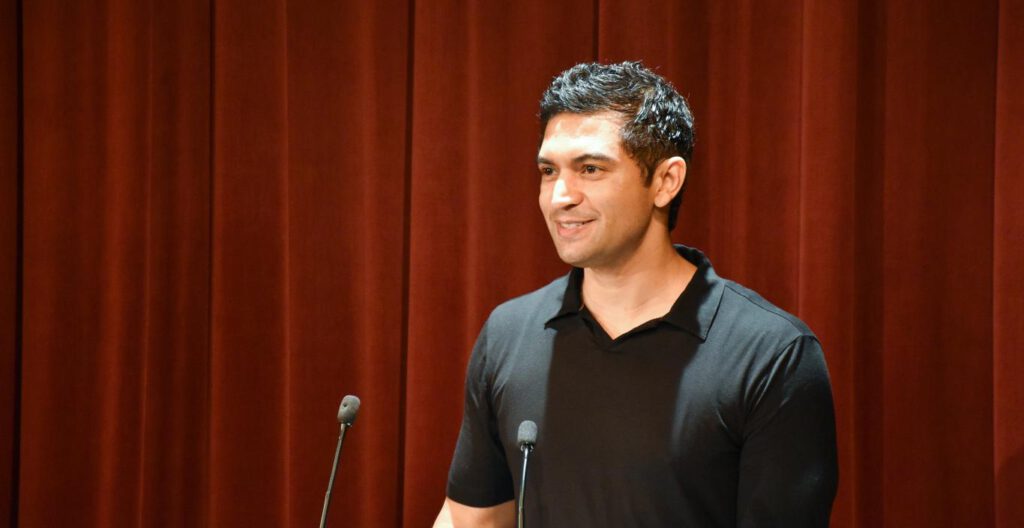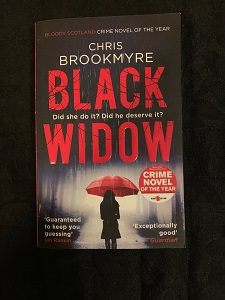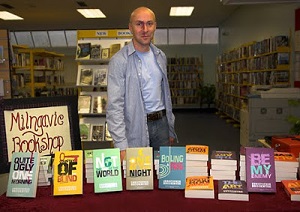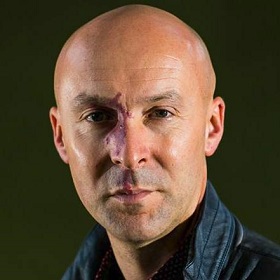De Amerikaanse schrijfster Jennifer Egan werd geboren in Chicago op 6 september 1962. Zie ook alle tags voor Jennifer Egan op dit blog.
Uit: Manhattan Beach
„It all started with seeing the girl. Anna had gone outside to buy lunch over the disapproval of her supervisor, Mr. Voss, who liked them to bring their lunches from home and eat them on the same tall stools where they sat measuring all day. Anna sensed anxiety in his wish to keep them in sight, as if girls at large in the Naval Yard might scatter like chickens. True, their shop was pleasant to eat in, clean and brightly lit by a bank of second-story windows. It had conditioned air, a humming chill that had filled every corner during the hot September days when Anna first came to work there. Now she would have liked to open a window and let in the fresh October air, but the windows were permanently shut, sealing out dust and grime that might affect the measurements she and the other girls took—or was it that the tiny parts they were measuring needed to be pristine in order to function? No one knew, and Mr. Voss was not a man who welcomed questions. Early on, Anna had asked of the unrecognizable parts in her tray, “What are we measuring, exactly, and which ship are they for’?”
Mr. Voss’s pale eyebrows rose. “That information isn’t necessary to do your job, Miss Kerrigan.”
“It would help me to do it better.”
I’m afraid I don’t follow’
“I would know what I was doing.’
The marrieds hid their smiles. Anna had been cast—or cast herself—in the role of unruly kid sister, and was enjoying it immensely. She found herself looting for little ways to challenge Mr. Voss without risking outright insubordination.
“You are measuring and inspecting parts to ensure that they are uniform,’ he said patiently, as if to a halfwit. °And you are setting aside any that are not.’
Soon it came to be known that the parts they were inspecting were for the battleship Missouri, whose keel had been laid almost a year before Pearl Harbor in Dry Dock 4. Later, the Missouri’s hull had been floated across ‘Nallabout Bay to the building ways: vast iron enclosures whose zigzagging catwalks evoked the Coney Island Cyclone. Knowing that the parts she was inspecting would be adjoined to the most modern battleship ever built had indeed brought some additional zest to the work for Anna. But not enough.
When the lunch whistle blew at eleven-thirty, she was itching to get outside. In order to justify leaving the building, she didn’t bring a lunch—a ploy she knew did not fool W. Voss. But he couldn’t very well deny a girl food, so he watched grimly as she made for the door while the marrieds unwrapped sandwiches from waxed paper and talked about husbands in boot camp or overseas; who’d had a letter; clues or hunches or dreams as to where their beloveds might be; how desperately frightened they where.”
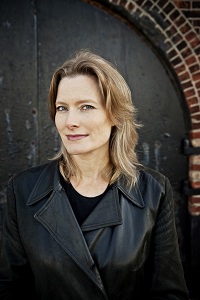
Jennifer Egan (Chicago, 6 september 1962)
De Nederlandse schrijfster Jessica Durlacher werd geboren in Amsterdam op 6 september 1961. Zie ook alle tags voor Jessica Durlacher op dit blog.
Uit: Schrijvers!
“Als ik de menselijke natuur werkelijk een beetje doorgrondde (en dat mag je van een schrijver toch verwachten), dan had ik misschien meteen gezien wat de gebeurtenissen die avond allemaal betekenden. Maar het eerste mailtje van Ada Hammerstein las ik ridicuul onbevangen. Misschien doordat het toen al nacht was, en ik niet alleen behoorlijk uitgeput, maar ook nog steeds van de kaart was van dat ellendige etentje bij Bastiaan. Een excuus dat overigens niet meer gold bij de tweede, derde, vierde en overige berichten die ik van (en later via) Ada ontving.
Ik herinner me nog goed de zwoele landerigheid van die zomeravond. De warmte van de dag was bewegingloos in de straat blijven hangen. Het was vredig, bijna stil. Flarden van vriendelijke stadsgeluiden drongen spaarzaam onder het gebladerte van de lommerrijke, brede straat door, alsof ze daar waren achtergelaten door de levendige zonnige dag die nu bijna ten einde was.
Op de stoep voor het huis van Bastiaan, de uitgever van zowel mijn verhalenbundel als mijn allereerste (en tot dusver enige) roman én alle vijftien meesterwerken van mijn geliefde, hadden we afscheid genomen van het gezelschap. Eindelijk had de behoefte om te vertrekken kennelijk bij iedereen vaste vormen aangenomen. Ferenc kuste me vluchtig. Nu pas zag ik opgedroogde blauwe verf onder zijn nagels – waarschijnlijk was de oude schilder volop aan het werk geweest voordat hij uit Duitsland was afgereisd. Het verklaarde zijn afwezige gedrag van die avond.
Zita, na al die jaren eindelijk Ferencs officiële levenspartner, omhelsde me met een theatraal gebaar. Ik voelde haar parfum in mijn kleren en mijn haar dringen – als van een poes die een geurvlag op me plantte. Ik moest mijn best doen haar niet van me af te duwen.
Bastiaan drukte me niet zo stevig tegen zich aan als anders. Ik kan het me verbeeld hebben maar ik merkte een zekere terughoudendheid in zijn greep. Misschien was het gêne om mij ten overstaan van de anderen een hart onder de riem te steken. Zijn vrouw, Kitty, een blondine met een zachtroze gepoederd aardappelgezichtje, wierp me een ongepast bemoedigende blik toe voor ze me onhandig zowel een hand als een wang toestak.
Ik had haast. Mijn lichaam stond al in sprintstand. Maar ik wilde niet weglopen zonder mijn echtgenoot. De boze, pijnlijke druk op mijn middenrif deed me verlangen naar de verlossende ruzie die ik voor hem in petto had.
‘Splettsssjjj!!’ Een ploffend geluid liet ons allemaal opschrikken. Op een auto die recht voor de deur van mijn uitgever geparkeerd stond barstte een dichtgeknoopt zakje water met een klap open. Alle blikken wendden zich naar de bovenverdieping van het huis van de directe overburen. Er leek gegiechel vandaan te komen, maar de boosdoeners zelf bleven onzichtbaar.”
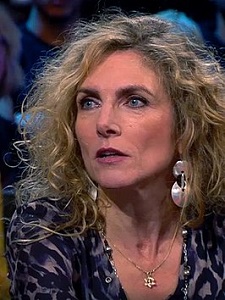
Jessica Durlacher (Amsterdam, 6 september 1961)
De Nederlandse dichter en schrijver Aart G. Broek werd op 6 september 1954 geboren in Maasland. Zie ook alle tags voor Aart G. Broek op dit blog.
Uit: Dushi Willemstad
“In die stad heeft ooit één wijk niet alleen de belangrijkste personages voor romans maar ook de meeste lezers ervan opgeleverd: Otrobanda. Tussen ca. 1920 en 1935 werden ruim een dozijn Papiamentstalige romans geschreven, die de rooms-katholieke moraal verdedigde. Wie zich daar niet aan wist te houden, zou kommerlijk ten ondergaan, zo wilde de nadrukkelijke boodschap. Deze tendensromans – van de hand van Willem Kroon, Manuel Fray en Miguel Suriel – waren vooral bedoeld voor mannen met een ambachtelijke achtergrond, hun vrouwen en jong volwassen kinderen. Die woonden in Otrobanda en liepen gevaar om te worden ‘opgeslokt’ door de westerse genoegens die de uitdijende raffinaderij met zich meebracht. Deze romans waren grotendeels gesitueerd in Otrobanda.
Het zal niet meevallen een kwalitatief interessant fragment in de Papiamentstalige romans te vinden, dat zou kunnen tippen aan de beschrijving die Tip Marugg ons achterliet van Otrobanda, de wijk waar hij werd geboren en opgroeide. Dat fragment verscheen in het Curaçaose tijdschrift Kristòf en werd natuurlijk ook opgenomen in zijn verzameld werk (De hemel is van korte duur [2009]). Hoe het ook zij, enige kennis van de Curaçaose letteren maakt in ieder geval nieuwsgierig naar wat Van Geemert binnen de grenzen van Willemstad de moeite waard vindt om onze aandacht op te vestigen. Die Papiamentstalige romans wel of juist niet?
Wandelend door ‘dushi Willemstad’ in de hitte van eind augustus/begin september werd ik alleen maar meer nieuwsgierig naar het gelijknamige boek van Van Geemert. Hoe hadden schrijvers van eilandelijke bodem eigenlijk naar hun stad gekeken? Zij niet alleen. Doen literaire passanten ook mee of worden die buiten het literaire Willemstad gelaten? Hoe hadden die passanten erop gereageerd, er zich door laten inspireren? Door de stegen, pleintjes, forten, het waaigat, de grote stadshuizen, de erven, de markten, de bars, winkels, de begraafplaatsen, de openluchtbordelen in de mondi aan de stadsrand, de kust, de haven, binnenwateren met mangroven … en bovenal door de mensen van zo een divers pluimage. Wandelend door ‘dushi Willemstad’ wist ik Van Geemert te vergeven, dat hij mij buiten het boek had gelaten. En straks, wanneer ik door de bladzijden van Dushi Willemstad struin, zullen de laatste kruimels aan wrevel ongetwijfeld worden weggeveegd”.
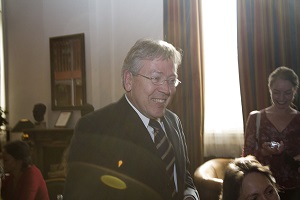
Aart G. Broek (Maasland, 6 september 1954)
De Schotse schrijver Christopher Brookmyre werd geboren op 6 september 1968 in Glasgow. Zie ook alle tags voor Christopher Brookmyre op dit blog.
Uit: Black Widow
“Them was a low background hiss as the courtroom awaited the playback, the volume on the speakers jacked up so much that Parlabane was bracing himself, expecting the soundfile to be booming and distorted. Instead it was surprisingly clear, particularly at the police end. I le could hear the dispatcher’s fag-ravaged breathing during pauses, the rattle of a keyboard in the background.
Nobody knows where to look when they’re listening to a recording. Parlabanc glanced around to see how people were responding. Most were looking at the floor, the walls or any fixed point that didn’t have a fact on it. Others were more pruriently taking the opportunity to look at the accused.
Diana Jager had her gaze locked, staring into a future only she could see.
The jury mostly had their heads bowed, like they were in church, or as though they were afraid they’d get into trouble with the judge if they were caught paying less than maximum attention. They were filtering out dis-traction, concentrating only on the words booming out around the court, anxious not to miss a crucial detail.
They couldn’t know it yet, but they were listening out for the wrong thing. ‘I think I’ve just seen an accident: Are you injured, madam?’ ‘No. But I think a car might have gone off the road: `Can you tell me your name, madam?’ `Yes, it Sheena. Sheena Matheson. Missus: And are you in your own vehicle now? Is it off the carriageway?’
‘No. Yes. I mean, I’m out of my car. Its parked. I’m trying to sec where he went: `Where am you, Mrs Matheson? `I’m not sum. Maybe a couple of miles west of Ordskirk. I’m on the Kingsburgh Road’ And can you describe what happened? Is someone injured?’
‘I don’t know. This car was coming around the bend towards me as I approached it It was going way too fast. I think it was a BMW. It swerved on to my side of the mad because of the curve, then swerved back again when I thought it was going to hit me. I jumped on the brakes because I got such a fright, and I looked in my mar-view. It swerved again like he was trying to get it back under control, but then it disappeared. I think it went off the road altogether:
`The Kingsburgh Road, you said? lbat’s right: `I’m going to sec if I can get some officers out them as soon as possible. You’ve parked your car, that’s good. If you can wait beside it but not in it .. “
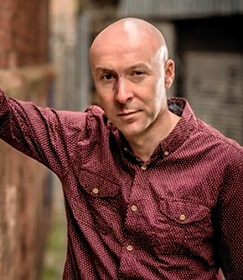
Christopher Brookmyre (Glasgow, 6 september 1968)
De Duitse schrijfster Amelie Fried werd geboren op 6 september 1958 in Ulm. Zie ook alle tags voor Amelie Fried op dit blog.
Uit: Ich fühle was, was du nicht fühlst
»So wird’s gehen«, sagte Bettina, packte mich resolut am Arm und zog mich aus dem Klassenzimmer. Widerstandslos ließ ich es geschehen.
Ich rechnete. Ich war genau dreizehn Jahre, vier Monate, vier Tage und elf Stunden alt. Wenn ich davon ausging, dass ich, bis ich fünfzig wäre, jeden Monat meine Periode bekommen würde, davon zweimal neun Monate abzog, falls ich Kinder bekommen würde, und wenn die Blutung im Schnitt fünf Tage dauerte, würde ich in den nächsten siebenunddreißig Jahren an zweitausendeinhundertzwanzig Tagen bluten. Fast sechs Jahre lang.
»Ich will keine Frau sein«, stöhnte ich.
»Red keinen Quatsch«, sagte Bettina.
Zu Hause versorgte mich meine Mutter mit Binden, öffnete eine Flasche Sekt und reichte mir ein halb gefülltes Glas.
»Ich bin so stolz auf dich!«, sagte sie.
Ich begriff nicht, warum sie mich feierte, als hätte ich eine besondere Leistung vollbracht. Meine guten Schulnoten riefen längst nicht so viel Begeisterung hervor, und an denen hatte ich deutlich mehr Anteil als an der blöden Blutung.
Wie so oft kam mir die Reaktion meiner Mutter übertrieben vor, irgendwie gekünstelt.
Als mein Vater kam, verkündete sie ihm die Neuigkeit mit einer Begeisterung, als hätte ich mindestens die Bundesjugendspiele gewonnen (was unwahrscheinlich war, weil ich grundsätzlich keinen Sport trieb).
Es war mir furchtbar peinlich, dass sie meinen Vater in diese Frauengeschichten einweihte, und ich spürte, dass es ihm ebenfalls unangenehm war.
»Du weißt ja, dass du ab jetzt aufpassen musst«, warf er mir hin. Und damit war das Thema für ihn offenbar erledigt.
Ich fragte mich, wie er auf die Idee kommen könnte, ich würde mit dreizehn bereits Sex haben. Seine Gedankenlosigkeit machte mich wütend.
»Wann hattest du denn zum ersten Mal Sex?«, fragte ich herausfordernd.
Er tat so, als müsste er überlegen. Ein unsicheres Auflachen. »Keine Ahnung, ist schon so lange her.«
Ich wusste, dass er log. Entweder es war ihm peinlich, dass er bei seiner Entjungferung schon ziemlich alt gewesen war, oder aber er fand es unangemessen, mit seiner dreizehnjährigen Tochter über Sex zu reden. Mir zu sagen, dass ich ab jetzt gefälligst vorsichtig sein solle, das war für ihn okay.
Aber zu erfahren, wann er zum ersten Mal Sex hatte – das stand mir offenbar nicht zu.”
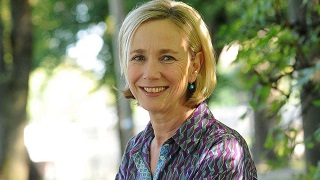
Amelie Fried (Ulm, 6 september 1958)
De Amerikaanse schrijfster Alice Sebold op 6 september 1962 in Madison, Wisconsin. Zie ook alle tags voor Alice Seebold op dit blog.
Uit: Lucky
“When people talk about climbing a mountain or riding rough water, they say they became one with it, their bodies so attuned to it that they often, when asked to articulate how they did it, cannot fully explain. Inside the tunnel, where broken beer bottles, old leaves, and other, as yet indiscriminate, things littered the ground, I became one with this man. He held my life in his hand. Those who say they would rather fight to the death than be raped are fools. I would rather be raped a thousand times. You do what you have to. “Stand up,” he said. I did. I was shivering uncontrollably. It was cold out and the cold combined with the fear, with the exhaustion, made me shake from head to toe. He dumped my purse and bag of books in the corner of the sealed-off tunnel. “Take off your clothes.” “I have eight dollars in my back pocket,” I said. “My mother has credit cards. My sister does too.” “I don’t want your money,” he said, and laughed. I looked at him. Into his eyes now, as if he was a human being, as if I could speak to him. “Please don’t rape me,” I said. “Take off your clothes.” “I’m a virgin,” I said. He didn’t believe me. Repeated his command. “Take off your clothes.” My hands were shaking and I couldn’t control them. He pulled me forward by my belt until my body was up against his, which was up against the tunnel’s back wall. “Kiss me,” he said. And he drew my head forward and our lips met. My lips were pursed tightly together. He tugged harder on my belt, my body pressing up further against his. He grabbed my hair in his fist and balled it up. He drew my head back and looked at me. I began to cry, to plead.”
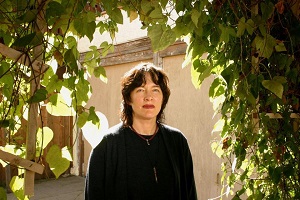
Alice Sebold (Madison, 6 september 1962)
De Frans – Amerikaanse schrijver Julien Green werd geboren op 6 september 1900 in Parijs. Zie ook alle tags voor Julien Green op dit blog.
Uit: Erinnerungen an glückliche Tage (Vertaald door Elisabeth Edl)
„Wir nannten sie kurz und bündig Goudeau. Wenn sie guter Laune war, amüsierte sie mein überspanntes Deklamieren, und sie lachte, den grauen Kopf schüttelnd, in sich hinein, doch manchmal zeigte sich bei ihr eine gewisse Reizbarkeit, die meine Mutter auf irgendeine jugendliche Liebesenttäuschung zurückführte.
»Sie muß einmal sehr hübsch gewesen sein, ich finde, das sieht man ihrem Gesicht noch immer an.«
Es war eine Spezialität meiner Mutter, Spuren von Schönheit unter den Runzeln der Leute zu entdecken oder verborgene Güte in ihren Seelen, aber meine Schwestern protestierten:
»Goudeau! Sie ist fast bucklig, und sie hat eine spitze rote Nase!«
»Sie ist nicht mit einer roten Nase auf die Welt gekommen, ihr dummen Gören, und sie ist nicht bucklig, nur ein wenig gebeugt von der vielen Arbeit.«
Ich fand Goudeau gewiß nicht attraktiv, aber sie war mir unentbehrlich. Eines Tages stürzte ich mich auf sie und schrie:
»Ihr habt meine Tochter entehrt! Zieht Euren Degen, Teufel, und verteidigt Euch!«
Sie kicherte leise und schob den Zwicker mit dem Drahtgestell zurecht.
»Leugnen ist zwecklos«, fuhr ich grimmig fort, »meine Tochter wird gegen Euch aussagen.«
Nach diesen Worten lief ich in die Küche, riß unter Linas verdutztem Blick den Schrank auf, packte einen der großen, vier Pfund schweren Brotlaibe, die man damals verkaufte, und wickelte ihn in eine Serviette. Ich brauchte auch einen Dolch, aber Dolche waren etwas Seltenes in unserem Haus und so gab ich mich mit dem Brotmesser zufrieden und eilte zurück.
»Hier ist meine Tochter«, brüllte ich. »Sie ist gekommen, Euch öffentlich anzuklagen.«
»Eure Tochter muß furchtbar jung sein, wenn sie noch in Windeln herumgetragen wird«, bemerkte Goudeau mit spöttischem Glucksen. »Seid Ihr sicher, Monsieur Julien, daß diese hier die Richtige ist?«
Ich befahl dieser Ausgeburt der Hölle zu schweigen, beschloß, meine Tochter lieber tot als entehrt zu sehen, und erdolchte sie, indem ich das Brotmesser mehrere Male in den Laib stieß.”

Julien Green (6 september 1900 – 13 augustus 1998)
De Nederlandse dichter, schrijver, journalist en vrijmetselaar Willem Brandt (pseudoniem van Willem Simon Brand Klooster) werd geboren in Groningen op 6 september 1905. Zie ook alle tags voor Willem Brandt op dit blog.
De weg
Ik zal den weg slechts gaan, dien gij mij wijst,
den steilen weg, die moeizaam wordt bereisd.
Dan zal ik haken naar Uw heerlijkheid
bij ied’re voetstap op het hard plaveid.
Wat neven mij of achter mij verschijnt,
ik zal mijn oogen richten naar uw eind.
Ik zal niet rusten, maar gestadig gaan,
ik zal mijn wil met uwen wil verstaan.
En zoo ik langs den weg wel dikwijls viel,
O, wees mij weer genadig als ik kniel,
boetvaardig om de naaktheid van mijn ziel.
Ik ben niet waardig dat degeen mij prijst
die in zijn rust beneden is vergrijsd.
Ik zal den steilen weg gaan, dien gij wijst.
Ochtend in Indonesië
Wakker worden in de vroege zon
spoelend door de raten van de luiken,
licht als water, waterlicht, te duiken
in de waterwitte morgenbron.
Knaap en vogel zijn al vroeger op,
kwaterend de mangga’s ingevlogen,
ook de maagden, bloemslank neergebogen,
sambal stampend in haar klapperdop.
Geur van zwarte koffie, blanke rijst,
houden ’t huis nog in intieme sferen.
Witte dag, wit hart, spierwitte kleren, –
tot de zon weer naar het zenith wijst.
Na de ochtend klinkt een droever wijs;
kon men maar ontwaken om te slapen.
Maagden, vogels en het spel der knapen
zijn van een voortijdig paradijs.
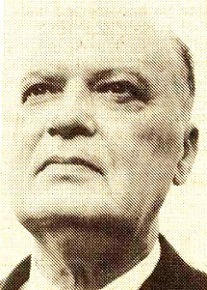
Willem Brandt (6 september 1905 – 29 april 1981)
De Duitstalige, Iraanse dichter en schrijver Cyrus Atabay werd geboren op 6 september 1929 in Teheran. Zie ook alle tags voor Cyrus Atabay op dit blog.
Wahrgemacht
Am Ende steht natürlich die Auflösung
Umwege über das Verworrene, Verknotete,
bis die Fesselung zur Freigabe wird.
Das alles hat viel mit Zauberei zu tun
hängt zusammen mit Magie und Mathematik:
Eine geringfügige Verschiebung in der Anordnung
der Bedingungen gewährt im Ausweglosen
einen Durchschlupf für das Unerwartete,
plötzlich wahrgemacht im Kuckucksruf,
der die Erklärbarkeit aufhebt.
Vom Widerhall
Allenfalls ein Kundiger
in den Klopfzeichen des Spechts,
die Abweichungen und Resonanzen
prüfend der wechselnden Baumstämme,
und jedes Holz hat einen anderen Ton.
Die Forderungen der Natur sind vielfältig
und der Nestbau nur eine
für diesen hellhörigen Vogel,
der beizeiten weiter zieht,
auf der Suche
nach einem unauffindbaren Echo.
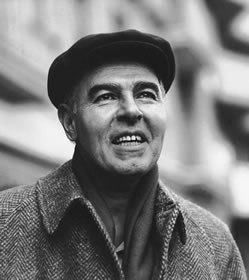
Cyrus Atabay (6 september 1929 – 26 januari 1996)
Zie voor nog meer schrijvers van de 6e september ook mijn blog van 6 september 2017 en ook mijn blog van 6 september 2015 deel 2.
